Professional Interview Appointment Letter
Subject: Interview Invitation for [Job Title] Position
Dear [Candidate Name],
We are pleased to inform you that you have been shortlisted for the [Job Title] position at [Company Name]. We would like to invite you for an interview to discuss your qualifications and experience in more detail.
Your interview is scheduled for [Date] at [Time], at [Location]. Please bring a copy of your resume and any other supporting documents.
Kindly confirm your attendance by replying to this email at your earliest convenience.
We look forward to meeting you.
Best regards,
[Sender Name]
[Job Title]
[Company Name]
[Contact Information]
Casual Email Interview Invitation
Subject: Let's Talk About Your Application!
Hi [Candidate Name],
Thanks for applying to [Company Name]! We’re excited to chat with you about the [Job Title] role. Can you join us for an interview on [Date] at [Time]? It’ll be a casual conversation at [Location/Online Link].
Please confirm if this works for you.
Cheers,
[Sender Name]
Preliminary Interview Appointment Email
Subject: Preliminary Interview Invitation – [Job Title]
Dear [Candidate Name],
Thank you for submitting your application for the [Job Title] position. We would like to conduct a preliminary interview to better understand your background and skills.
Your preliminary interview is scheduled for [Date] at [Time] via [Platform/Location]. This will be a short session lasting approximately [Duration] minutes.
Please confirm your availability at your earliest convenience.
Sincerely,
[Sender Name]
[Company Name]
Formal Official Interview Letter
Subject: Official Interview Schedule Notification
Dear [Candidate Name],
This letter serves as an official notification that you have been selected for an interview for the [Job Title] position at [Company Name].
Interview Details:
Date: [Date]
Time: [Time]
Venue: [Location]
Please carry the necessary documents including your resume, educational certificates, and identity proof. Confirm receipt of this letter to ensure your attendance.
Sincerely,
[Sender Name]
[Job Title]
[Company Name]
Quick Phone Interview Message
Subject: Phone Interview Invitation
Hi [Candidate Name],
We’d like to schedule a quick phone interview for the [Job Title] position at [Company Name]. Please be available on [Date] at [Time]. The call will last about [Duration] minutes.
Reply to confirm your availability.
Thank you,
[Sender Name]
Heartfelt Interview Invitation Email
Subject: Excited to Meet You!
Dear [Candidate Name],
We were very impressed with your application for the [Job Title] role at [Company Name]. We would be delighted to invite you for an interview on [Date] at [Time], held at [Location/Online].
This is a wonderful opportunity to learn more about each other. Please confirm your availability.
Warm regards,
[Sender Name]
[Job Title]
[Company Name]
Informal Interview Invitation Message
Subject: Interview Time
Hey [Candidate Name],
Thanks for applying! Can we meet on [Date] at [Time] for a chat about the [Job Title] role? It’ll be at [Location/Online].
Let me know if that works.
Cheers,
[Sender Name]
What / Why: Purpose of an Interview Appointment Letter
- An interview appointment letter formally informs a candidate that they have been selected for an interview.
- It communicates the date, time, venue, and format of the interview.
- Purpose: To ensure clarity, confirm candidate attendance, and establish professionalism in the recruitment process.
Who Should Send an Interview Appointment Letter
- Typically sent by HR personnel, recruitment officers, or hiring managers.
- Can also be sent by an automated HR system for large-scale recruitment.
- Should appear as coming from the company or organization responsible for hiring.
Whom Should Receive the Letter
- Directly addressed to shortlisted candidates.
- Can be sent individually or in batches if multiple candidates are scheduled for interviews.
- For internal transfers or promotions, addressed to employees applying for different roles.
When to Send an Interview Appointment Letter
- After shortlisting candidates from applications or resumes.
- For preliminary interviews or screening calls.
- Before formal interviews to confirm schedules.
- When rescheduling or changing interview details.
How to Write and Send the Letter
- Determine interview details: date, time, venue, interviewer(s), and duration.
- Choose tone: formal for official letters, casual for friendly email invites.
- Include essential details: candidate name, position applied for, and required documents.
- Send via email for digital convenience or printed letter for official documentation.
- Ensure confirmation request is included.
How Many Candidates Can Receive the Letter
- Each candidate should receive a personalized letter, but group invitations are possible for group interviews.
- Companies may send letters to multiple candidates in bulk using email automation tools.
Requirements and Prerequisites
- Shortlisted candidate list.
- Interview schedule and interviewer availability.
- Venue or online platform access.
- Documents required from candidates.
- Confirmation mechanism (reply email, phone call, or form).
Formatting Guidelines
- Length: 100–250 words.
- Tone: varies from formal, professional, casual, to heartfelt depending on context.
- Structure: subject, greeting, main content, instructions, closing.
- Mode: email for speed, printed letter for official purposes.
- Etiquette: polite, clear, and concise language.
After Sending / Follow-up
- Track candidate confirmations.
- Send reminders 1–2 days before the interview.
- Reschedule promptly if conflicts arise.
- Maintain communication until interview completion.
Pros and Cons of Sending an Interview Appointment Letter
Pros:
- Establishes professionalism and clarity.
- Confirms attendance and reduces scheduling conflicts.
- Serves as formal documentation for both parties.
Cons:
- Requires careful timing to avoid confusion.
- Overuse of casual tones may reduce perceived professionalism.
- Missing information can cause misunderstandings.
Compare and Contrast with Other Methods
- Compared to a phone call: Letter provides written proof, more formal.
- Compared to SMS: Less casual but more professional.
- Compared to online scheduling tools: Letter adds personal touch and clarity.
- Alternative: Automated email notifications vs personalized letters.
Tricks and Tips
- Include a map or link to the venue for clarity.
- Attach an agenda or interview schedule if multiple rounds.
- Always ask for confirmation to prevent no-shows.
- Use polite but concise language.
- Double-check dates, times, and candidate names before sending.
Common Mistakes to Avoid
- Sending without confirmation request.
- Missing essential details like date, time, or location.
- Using unclear or inconsistent tone.
- Forgetting to include required documents or instructions.
- Sending last-minute notices without adequate time for preparation.
Elements and Structure of an Interview Appointment Letter
- Subject line clearly stating purpose.
- Greeting using candidate’s name.
- Main message outlining interview details.
- Instructions for documents or preparation.
- Request for confirmation of attendance.
- Closing with sender name, title, and company information.
- Optional attachments (agenda, map, guidelines).
Does it Require Attestation or Authorization?
- Usually does not require formal attestation.
- In some governmental or official institutional interviews, an authorized signature may be required.
- Digital email confirmations are generally sufficient for private sector roles.
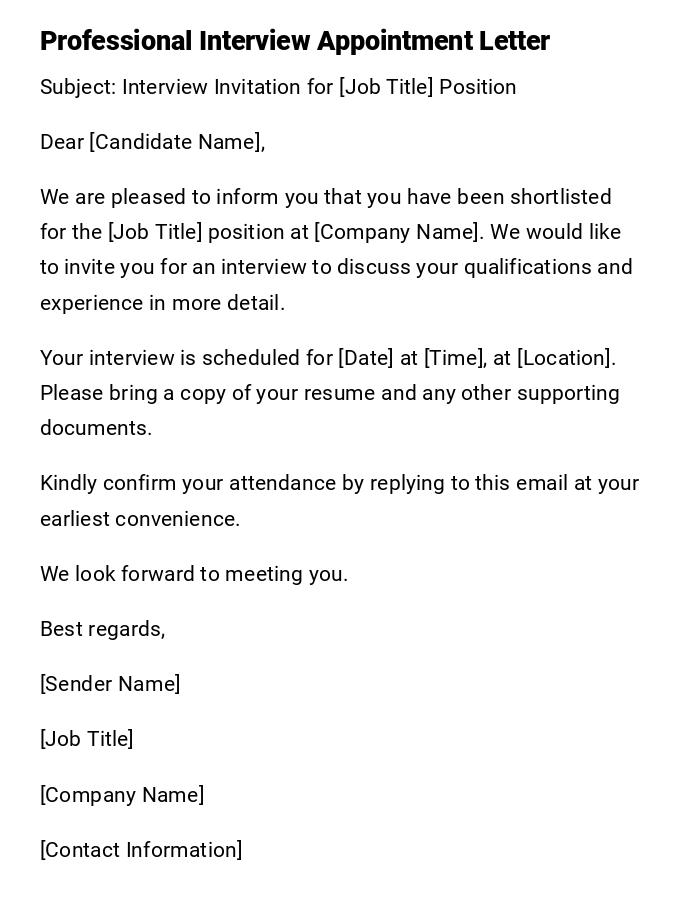
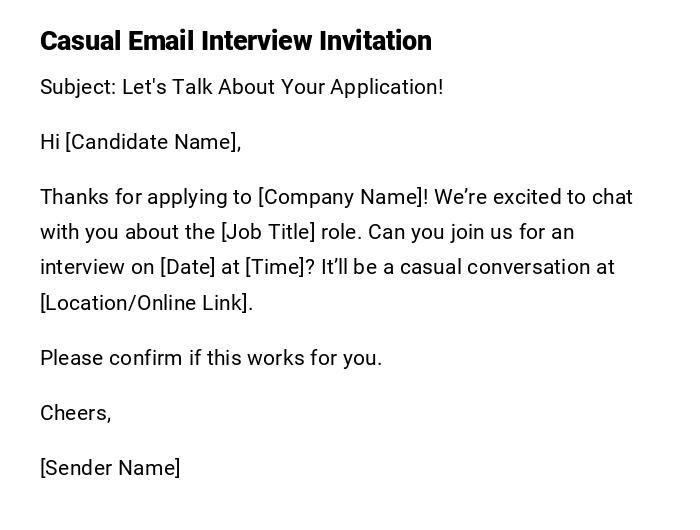
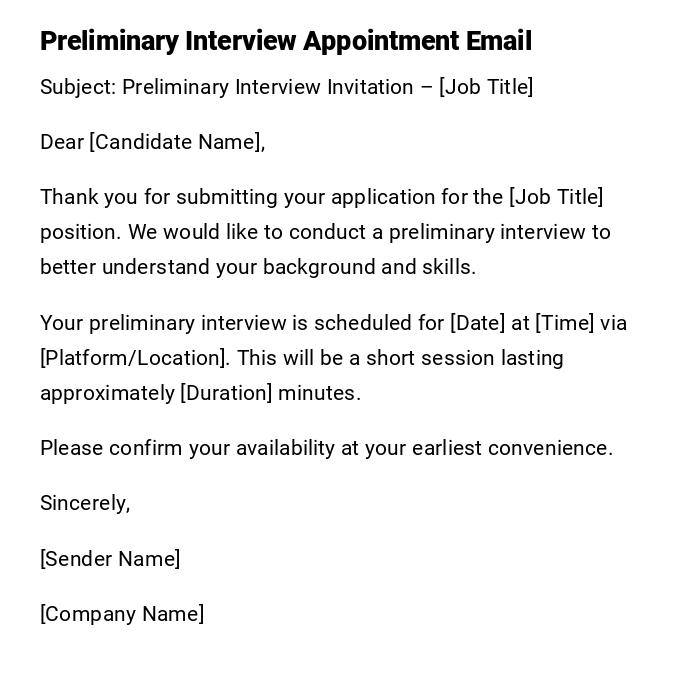
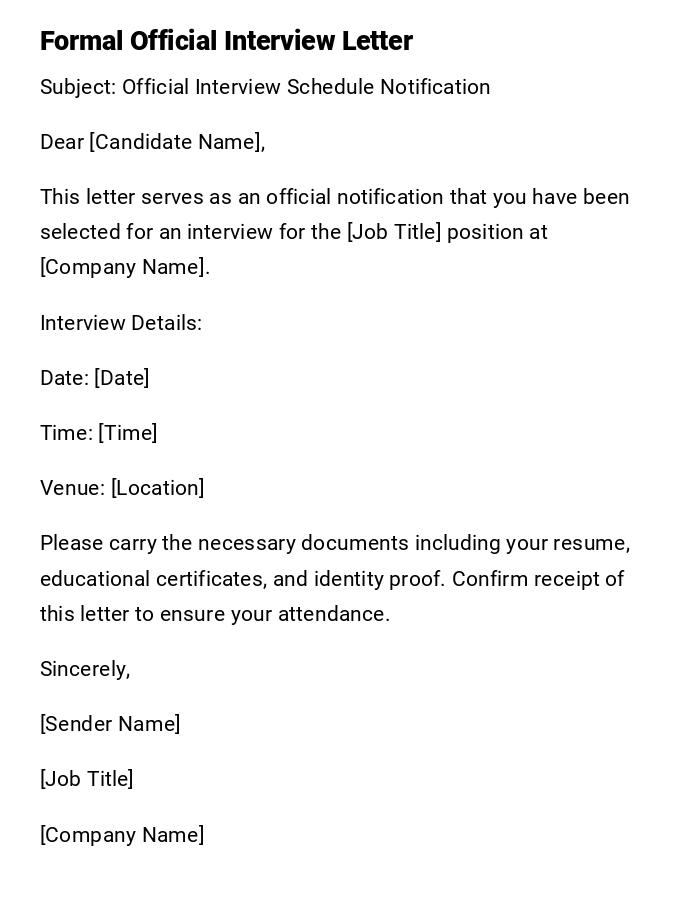
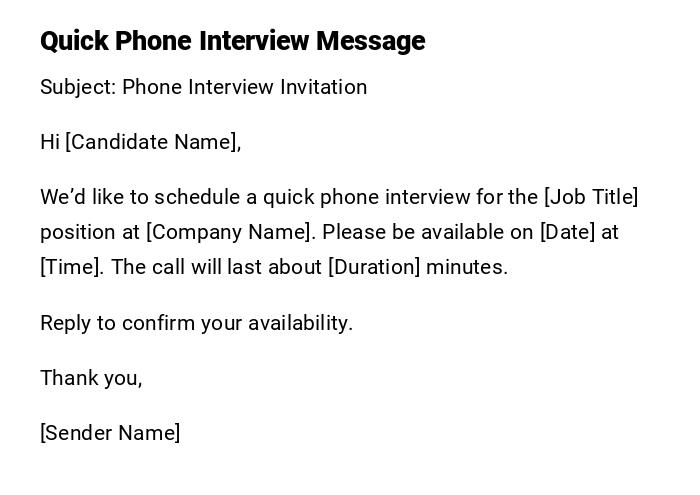
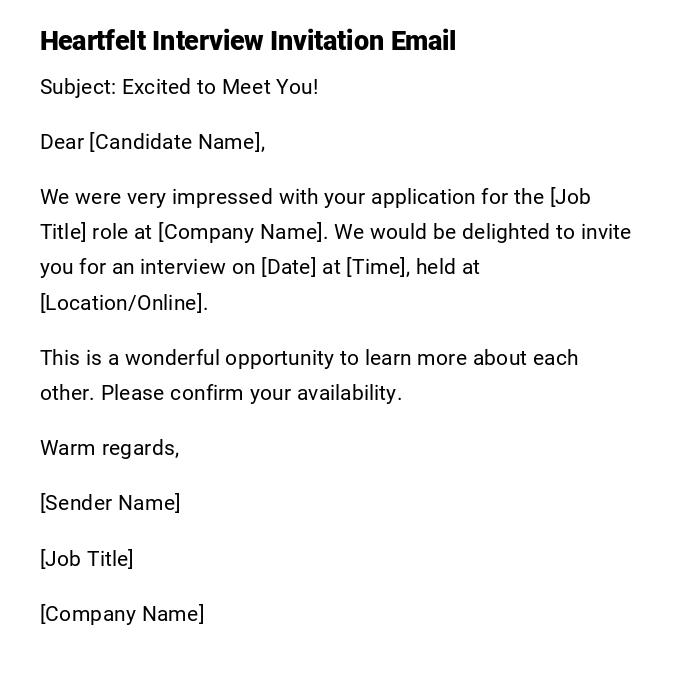
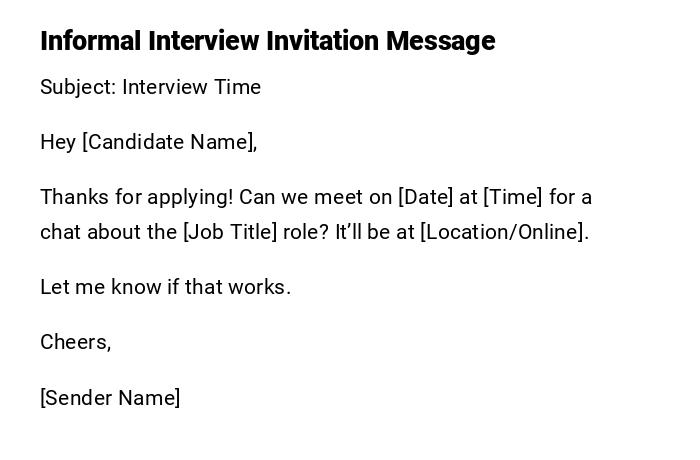

 Download Word Doc
Download Word Doc
 Download PDF
Download PDF